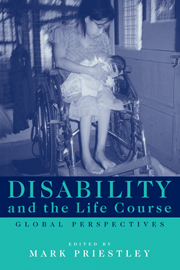Book contents
- Frontmatter
- Contents
- List of figures
- List of tables
- Notes on contributors
- Preface
- Acknowledgements
- A brief note on terminology
- I Concepts
- II Methods and stories
- III The politics of transition
- 13 Disabled children: an emergency submerged
- 14 Failing to make the transition? Theorising the ‘transition to adulthood’ for young disabled people
- 15 Breaking my head in the prime of my life: acquired disability in young adulthood
- 16 Work and adulthood: economic survival in the majority world
- 17 The possibility of choice: women with intellectual disabilities talk about having children
- 18 Ageing with disability in Japan
- 19 Ageing with intellectual disabilities; discovering disability with old age: same or different?
- 20 Epilogue
- Index
15 - Breaking my head in the prime of my life: acquired disability in young adulthood
Published online by Cambridge University Press: 30 September 2009
- Frontmatter
- Contents
- List of figures
- List of tables
- Notes on contributors
- Preface
- Acknowledgements
- A brief note on terminology
- I Concepts
- II Methods and stories
- III The politics of transition
- 13 Disabled children: an emergency submerged
- 14 Failing to make the transition? Theorising the ‘transition to adulthood’ for young disabled people
- 15 Breaking my head in the prime of my life: acquired disability in young adulthood
- 16 Work and adulthood: economic survival in the majority world
- 17 The possibility of choice: women with intellectual disabilities talk about having children
- 18 Ageing with disability in Japan
- 19 Ageing with intellectual disabilities; discovering disability with old age: same or different?
- 20 Epilogue
- Index
Summary
Peter is a young single man. He owns his own home, which he shares with his parents, living in a detached flat in the backyard. He sustained a traumatic brain injury in a motor vehicle accident when he was 19, which has resulted in a range of cognitive impairments that severely compromise his capacity to relate independently in the social world, as well as manage his own care. Prior to his injury, Peter was an apprentice fitter and turner. He now receives a disability support pension and purchased his home from his insurance settlement. A financial adviser manages his funds. He is unable to drive a car, so he relies on his mother to drive him or uses taxis, as public transport is not available in the semi-rural area where he lives. He describes himself as lonely; his dream is to find ‘that special person’.
I think I had a dream of a you beaut champion friend … You know someone that could be with me all the time … and I've got that once a week so I can't ask anything more.
Peter has not made friends through the community access service, which provides him some support, although for many others the service is their major source of friends. He rarely attends the actual premises. From Peter's perspective, and despite having brain injury in common, he finds little to share with the other consumers.
- Type
- Chapter
- Information
- Disability and the Life CourseGlobal Perspectives, pp. 179 - 191Publisher: Cambridge University PressPrint publication year: 2001
- 3
- Cited by

